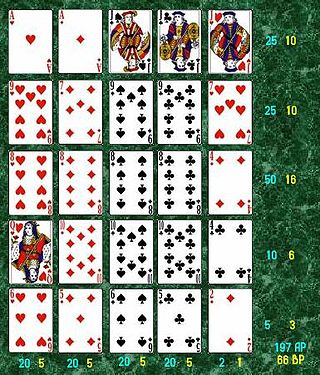Related Research Articles

Press Your Luck is an American television game show created by Bill Carruthers and Jan McCormack. Contestants answer trivia questions to earn "spins" on a randomly cycling game board. The board's spaces display cash, prizes, extra spins, special items, or the show's mascot, a cartoon creature known as the Whammy. Landing on a Whammy eliminates any cash and prizes accumulated while also displaying a short comedic animation. Its format is a revival of an earlier Carruthers production, Second Chance, which was hosted by Jim Peck and aired on ABC in 1977. The original version of Press Your Luck aired on CBS between 1983 and 1986. This version featured Peter Tomarken as host, Rod Roddy as announcer, and Carruthers as both director and voice of the Whammy. The original incarnation of the show gained significant media attention in 1984 for contestant Michael Larson, who won over $100,000 after memorizing the original pattern of the game board.

Pyramid is an American game show franchise that has aired several versions domestically and internationally. The show was developed by Bob Stewart. The original series, The $10,000 Pyramid, debuted on CBS on March 26, 1973, and spawned seven subsequent Pyramid series. Most later series featured a full title format matching the original series, with the title reflecting an increasing top prize. Two teams, each consisting of a celebrity and contestant, attempt to convey mystery words and phrases within a common category, against a time limit, to win cash and prizes. The title refers to the show's pyramid-shaped gameboard, featuring six categories arranged in a triangular fashion. The various Pyramid series have won a total of nine Daytime Emmys for Outstanding Game Show, second only to Jeopardy!, which has won 13.

Name That Tune is an American television music game show. Originally created and produced by orchestra conductor Harry Salter and his wife Roberta Semple Salter, the series features contestants competing to correctly identify songs being played by an on-stage orchestra or band.

Supermarket Sweep is an American television game show. Teams of contestants answer trivia questions before competing in a timed race to gather grocery items from the aisles of a supermarket. The original show was broadcast on ABC from December 20, 1965 to July 14, 1967. Later seasons aired on Lifetime from February 5, 1990 to June 16, 1995, and later on PAX from April 3, 2000 to May 23, 2003, with reruns airing until March 26, 2004. Another version of the show aired from October 18, 2020 to January 30, 2022, also on ABC.

The Crystal Maze is a British game show devised by Jacques Antoine, based upon his format for the French game show Fort Boyard, and produced for Channel 4. The programme focuses on teams of contestants, a mixed group of men and women, attempting a range of challenges to earn time required to help them complete one final challenge, which if completed successfully earns them a prize. The premise of the show is themed around challenges set to different periods of human history within a fictional labyrinth of time and space, and is notable for the use of golf ball-sized Swarovski glass crystals as a reward for each challenge successfully completed by contestants, and lock-in conditions for contestants that ran out of time or broke a three-strikes rule on a challenge.
Concentration is an American television game show based on the children's memory game of the same name. It was created by Jack Barry and Dan Enright. Contestants matched prizes hidden behind spaces on a game board, which would then reveal portions of a rebus puzzle underneath for the contestants to solve.

Figure It Out is an American children's panel game show that aired on Nickelodeon. The original series, hosted by Summer Sanders, ran for four seasons from July 7, 1997, to December 12, 1999. The show was revived in 2012, with Jeff Sutphen as host, with the revival airing from June 11, 2012, to July 16, 2013. The series was originally recorded at Nickelodeon Studios at Universal Studios in Orlando, Florida. The revival episodes were filmed on stage 19 at Paramount Studios in Los Angeles.
Maailman ympäri is a Finnish quiz show shown on YLE TV1 from 2000 to 2004.

Poker Squares is a patience game with the objective of building the best poker hands using just 25 cards from the deck. It rewards both lucky guessing and accurate calculation of odds.

High Rollers is an American television game show created by Merrill Heatter. Two contestants compete to answer trivia questions and gain control of an oversized set of dice, which they then roll to eliminate the numbers 1 through 9 from a game board in order to win cash and prizes. It is an adaptation of the standard dice game shut the box.
A*mazing is an Australian children's television game show that aired between 16 May 1994 until 1998 on the Seven Network. It was famous for a relatively large and elaborate maze/obstacle course that was part of the show's studio set. A*mazing was hosted by James Sherry for the entire run of the series. A*mazing was produced at Channel 7 in Brisbane from 1994 to 1996 and then at Channel 7 in Perth from 1997 to 1998.

Game Ka Na Ba?, formerly Million-Million Na! Game Ka Na Ba?, Next Level Na! Game Ka Na Ba?, and Pilipinas Game Ka Na Ba is a Philippine television game show broadcast by ABS-CBN and Jeepney TV. Originally hosted by Kris Aquino, it aired on ABS-CBN's Primetime Bida line up from October 8, 2001 to February 27, 2004, and was replaced by Star Circle Quest. The show moved to the Bigtime Trio line up from November 15, 2004 to October 23, 2009, and was replaced by Showtime. The show was revived to Jeepney TV from October 12, 2020 to November 19, 2021 and on Kumu from February 19 to June 18, 2022. Robi Domingo serve as the final host.
Starcade is an American game show where contestants competed against one another by playing arcade video games. The series originally aired on WTBS from 1982 to 1983, followed by a run in syndication for the following season.
In the Grid is a British game show that aired on Five from 30 October 2006 to 2 February 2007, hosted by Les Dennis.

Wheel of Fortune is an American television game show created by Merv Griffin. The show has aired continuously since January 6, 1975. Contestants solve word puzzles, similar to those in hangman, to win cash and prizes determined by spinning a giant carnival wheel. The current version of the series, which airs in nightly syndication, premiered on September 19, 1983.
Family Game Night is an American television game show based on Hasbro's family of board games and EA's video game franchise of the same name. The show was hosted by Todd Newton. Burton Richardson was the announcer for the first two seasons; he was replaced by Stacey J. Aswad in the third season, and Andrew Kishino was hired for the fourth season. The 60-minute program debuted on October 10, 2010, on The Hub ; it was previewed on October 9, 2010, on its sister channel, TLC. Seasons 1 and 2 contained 26 and 30 episodes respectively. Seasons 3, 4 and 5 each contained 15 episodes. Season 2 premiered on Friday, September 2, 2011, with additional games being added. The games added to the second season included Cranium Brain Breaks, Green Scream, Ratuki Go-Round, Simon Flash, Operation Sam Dunk, Trouble Pop Quiz, and Spelling Bee. However games from the previous season were still kept.

Codenames is a 2015 party board game designed by Vlaada Chvátil and published by Czech Games Edition (CGE). In it, two teams compete by each having a "spymaster" give one-word clues that can point to specific words on the board. The other players on the team must attempt to guess their team's words while avoiding the words of the other team as well as an assassin square; if the latter is selected, then the team which selected it instantly loses. Victory is achieved when one team guesses all of their spymaster's assigned words.

Ellen's Game of Games, also known as Game of Games and stylized as ellen's GAME OF GAMES, is an American television game show that aired on NBC. In March 2017, NBC ordered six hour-long episodes of the series. Ellen DeGeneres serves as host, while Stephen "tWitch" Boss appears as announcer/sidekick. The series is based on game segments from DeGeneres' daytime talk show, The Ellen DeGeneres Show. The series premiered on December 18, 2017. On February 18, 2020, DeGeneres announced on The Ellen DeGeneres Show that the series was renewed for a fourth season, which began airing on October 6, 2020. In January 2022, the series was canceled after four seasons.

The Devil's Plan is a South Korean reality game show. The first season premiered on September 26, 2023, on Netflix. Twelve contestants compete in both collaborative and competitive strategy games in order to win a cash prize.
References
- 1 2 3 Lu, Zhouxiang (2022). A History of Competitive Gaming. New York: Routledge. pp. 51–52. ISBN 978-0-367-55961-8 . Retrieved 2023-07-01– via Google Books.
- ↑ "Sun Line". The Jackson Sun . 1984-08-16. Archived from the original on 2023-07-01. Retrieved 2023-07-01– via Newspapers.com.
- ↑ Terrace, Vincent (1991). Fifty Years of Television: A Guide to Series and Pilots, 1937–1988. New York: Rosemont Publishing & Printing. p. 768. ISBN 0-8453-4811-6 . Retrieved 2023-07-01– via Internet Archive.
- ↑ Schwartz, David; Ryan, Steve; Wostbrock, Fred (1995). "The Video Game". The Encyclopedia of TV Game Shows (2 ed.). New York: Facts on File. p. 216. ISBN 0-8160-3093-6 . Retrieved 2023-07-01– via Internet Archive.
- ↑ Terrace, Vincent (1985). Encyclopedia of Television: Series, Pilots and Specials 1974–1984. New York: BASEline. p. 434. ISBN 0-918432-61-8 . Retrieved 2023-07-01– via Internet Archive.
- ↑ Nedeff, Adam (2023-05-24). "A Donkey Kong Game Show? Starcade Provided Video Gaming Star Power". The Strong National Museum of Play. Archived from the original on 2023-07-01. Retrieved 2023-07-01.
- ↑ "Syndication". Variety . Vol. 288, no. 41. 1985-09-23. p. 90. EBSCOhost 2587875477.
- ↑ Mitchell, John (1984-09-14). "Newbury Park pair bring home TV game show loot". Thousand Oaks Star. Archived from the original on 2023-07-01. Retrieved 2023-07-01– via Newspapers.com.
- ↑ Lu, Zhouxiang (2023). "Esports". In Wolf, Mark J.P.; Perron, Bernard (eds.). The Routledge Companion to Video Game Studies (2 ed.). New York: Routledge. pp. 310–317. doi:10.4324/9781003214977-44. ISBN 978-1-032-08123-6 . Retrieved 2023-07-01– via Google Books.